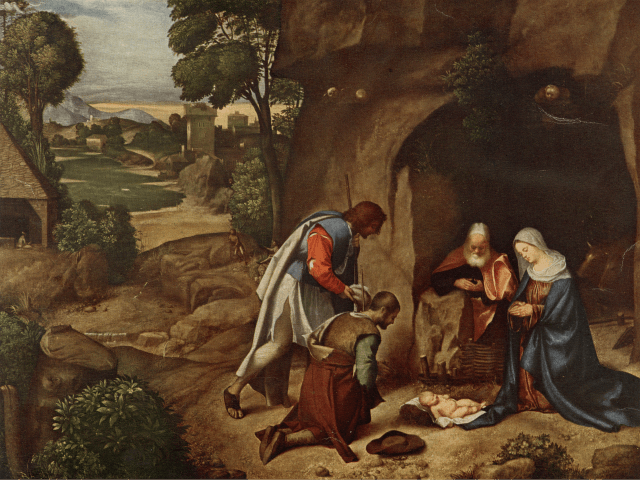“‘Behold, the virgin shall conceive and bear a son, and they shall call his name Immanuel’ (which means, God with us).”—Matthew 1:23 (quoting Isaiah 7:14).
While billions across the globe celebrate Christmas as a cultural event for family and exchanging gifts, for countless faithful Christians it is about celebrating the birth of Jesus Christ, Emmanuel – “God with Us” – whom they believe was born not only to reveal the will of God, but more importantly to die so that billions may live.
For more than 2,000 years before Jesus of Nazareth was born, in Israel prophets foretold that God would send an Anointed One – the Hebrew word for which is Messiah, and the Greek word is Christ – who would deliver God’s people.
These centuries of prophesies are recorded in the Old Testament of the Bible, predicting dozens of specific attributes of this Messiah, including that he would be a descendant of King David, that he would be born in Bethlehem, that he would be a ruler, and that he would be a teacher.
The Christmas story is the story of the Incarnation. For more than 2,000 years after Jesus’ birth, Christians have believed that this person, who has had more impact on world history than any other, was more than a moral philosopher or humanitarian visionary. Christians say – as the New Testament of the Bible teaches – that the Messiah is God himself, that God took on the form of a human. In other words, God Incarnate, sent from God the Father.
As the Book of Philippians says, Jesus:
who, though he was in the form of God, did not count equality with God a thing to be grasped, but emptied himself, by taking the form of a servant, being born in the likeness of men. And being found in human form, he humbled himself by becoming obedient to the point of death, even death on a cross.
The Book of Isaiah, which is the largest prophetical book in the Old Testament, written before 700 B.C., contains many prophesies concerning the Messiah. One of those prophecies is found in Isaiah 7:14: “Therefore the Lord himself will give you a sign. Behold, the virgin shall conceive and bear a son, and shall call his name Immanuel.”
These words are quoted in the New Testament in Matthew 1:23, and set to music in the Christmas hymn O Come O Come Emmanuel, which begins:
O Come O Come Emmanuel,
And ransom captive Israel
That mourns in lonely exile here
Until the Son of God appear.
As the New Testament Book of Romans explains in Romans 9 and 10, Christians believe that these references to “Israel” are to all of God’s people, who through the millennia can be found all over the world. And so people of all nations can sing the refrain, “Rejoice! Rejoice! Emmanuel shall come to thee, O Israel.”
Some of these prophetic terms seem too grand to be referring to a human, and others even explicitly reference divinity.
As the Prophet Isaiah proclaimed:
For to us a child is born, to us a son is given; and the government shall be upon his shoulder, and his name shall be called Wonderful Counselor, Mighty God, Everlasting Father, the Prince of Peace. Of the increase of his government and of peace there will be no end, on the throne of David and over his kingdom, to establish it and to uphold it with justice and righteousness from this time forth and forevermore. The zeal of the Lord of hosts will do this.—Isaiah 9:6–7 (ESV).
For Christians, the first Christmas in Bethlehem would begin a climatic chapter in the dramatic saga of humanity, a chapter that would culminate a short distance away in Jerusalem more than 30 years later, when that same Jesus would die on a cross outside the city, and then – Christians say – was resurrected from the dead on Easter Sunday, opening the way to forgiveness and eternal life to all who would come in faith for mercy.
As one version of O Come O Come Emmanuel continues:
O come, O Branch of Jesse stem,
Unto your own and rescue them!
From depths of hell your people save,
And give them victory o’er the grave.
Christmas is a celebration of Christians’ believing that these many centuries of prophesies were fulfilled in Jesus, and still sing 2,000 years later, from Hark the Herald Angels Sing:
Hail the heaven-born Prince of Peace!
Hail the Son of Righteousness!
Light and life to all he brings,
Risen with healing in his wings.
Mild he lays his glory by,
Born that man no more may die:
Born to raise the sons of earth,
Born to give them second birth.
Hark! The herald angels sing,
“Glory to the new-born King!”
That is the Christmas story many are celebrating during this time of year. Merry Christmas to all!
Ken Klukowski is senior legal editor for Breitbart News. Follow him on Twitter @kenklukowski.

COMMENTS
Please let us know if you're having issues with commenting.